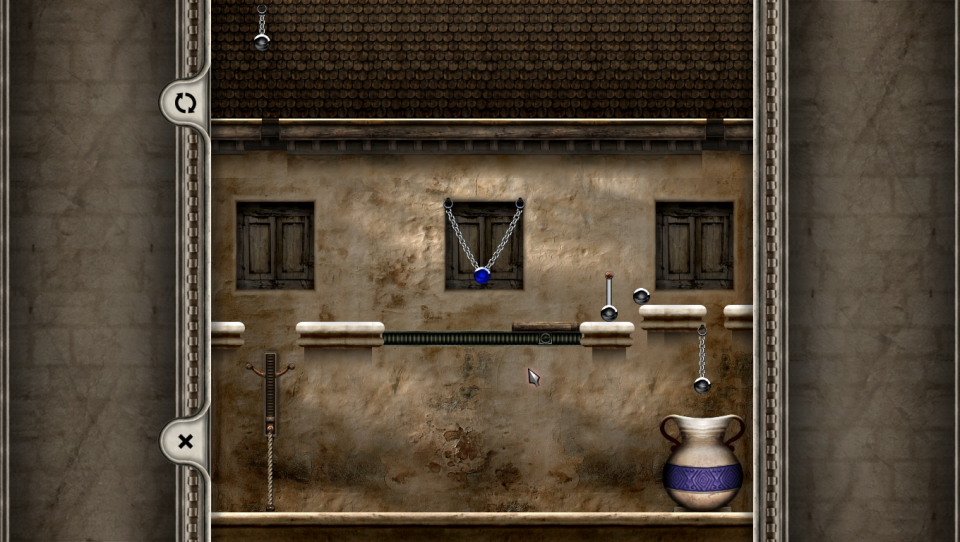Mento's May Madness More: #14 - Obulis
By Mento 2 Comments
May the Fourteenth

The game: IonFx Studios's Obulis
The source: Bundle Stars' Catnip Bundle
The pre-amble: Obulis is a physics-based puzzle game in which the player must sever chains and ropes holding up marbles in such a way that they all end up in identically-colored receptacles. As well as puzzling out which rope is meant to be severed when, the player needs a keen sense of timing and precision in order to solve each stage. The marbles have momentum and force but zero friction: once a marble starts moving, it takes a slope or an obstacle to get them to stop again.
The playthrough: Obulis is a very straightforward take on Cut The Rope by way of something like Peggle and, were I to be a bit more crass, is mostly just balls whizzing in front of your face for hours. However, despite the simple set-up it's actually quite a bit of addictive fun. The key to its appeal is that the puzzles aren't nearly as difficult as they seem, at least early on. A nice, steady difficulty curve that constantly introduces new elements (there are quite a few Incredible Machine-esque contraptions that come into play) is the sign of a well-crafted puzzle game.

The presentation around the puzzles is less remarkable. It's all very pleasant and polished, with a Egyptian theme that more than reminds me of Luxor (another casual puzzle game focused around marbles), but there's nothing really to be said about it. I tend to get the impression with many of these low-budget puzzle games that the graphics and music are crafted only to meet a satisfactory level of quality and the chief focus is instead spent on the design of the individual puzzles, which seems like the entirely right way to go about developing a puzzle game.
If I have a complaint with this game, it's one that's slightly more universal with games of its ilk: that of the Precision Predicament. Yep, I even capitalized it. Many of these games depend on precise operations and it's an aspect of skill that is most prone to human error. There's a reason musicians rehearse and practice for hours, and surgery is one of the most difficult careers in the world, and it's because we can't be as mechanically precise as a ruler or a calculator: our brains simply don't work that way. So while certain facets of human intelligence are at the forefront with Obulis - puzzle-solving, spatial reasoning, reliably predicting several steps in advance - more often than not it is the precision part of the process that tends to let one down. Say we have a puzzle in which a certain order of ropes need to be cut (this is, in fact, every puzzle in the game but bear with me here) with the last of which needing to be cut at a precise moment - by the time the player has figured out this order, and are ready to move onto the next puzzle, they're stymied because they're still trying to nail the right moment to cut that last chain. Over and over, each time just a millisecond or so too early or late. The game's built to be as frustration-free as possible - most stages are very short and will reset instantaneously when a button is clicked - but when the obstacle blocking one's progress isn't the smarts to figure out the puzzle but a relatively torpid reaction speed, it's a little disheartening. This is opposed to something action-based like a shooter, in which precision is simply one aspect of a greater skillset required to excel.
Still, I'm grousing about an issue to applies to a wide range of games, so it's unfair to single out Obulis for it. While the game's nothing special and is pretty much exactly how it appears, it is every bit a competently made game. It was clearly enough to get IonFx's foot in the door, as they went on to produce the much stranger and more interesting Miasmata. Proving yourself by doing a simple puzzle game right has frequently been the first step of a great many of the industry's best developers, after all. Hey, that's not a bad idea for a list...
The verdict: Eh, maybe. It is satisfying to solve a puzzle, but I have a habit of dropping off puzzle games as they get tougher and require even more precise timing.


2 Comments